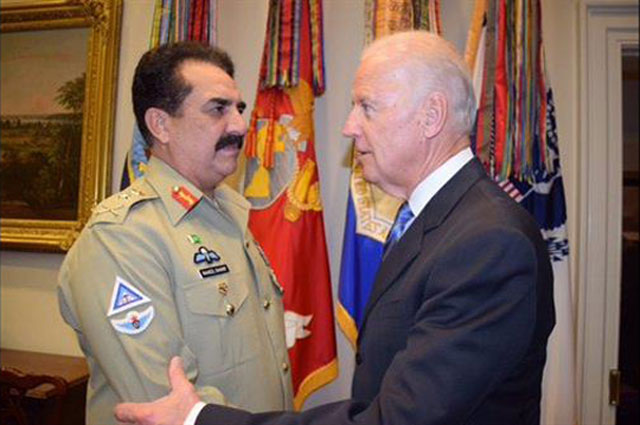Pak Army Chief Follows PM Sharif To Washington
General Raheel Sharif, met US Vice President Joe Biden

NEW DELHI: Pakistan’s military chief, General Raheel Sharif, made his second trip to the United States in less than a year. The visit comes on the heels of Pakistani Prime Minister Nawaz Sharif’s trip to Washington, and indicates that as far as Pakistan is concerned, the military matters as much if not more than the civilian leadership.
Gen. Sharif met the entire US military leadership, Secretary of State John Kerry, Secretary of Defense Ashton Carter and the head of the CIA, John Brennan, US Vice President Joe Biden and National Security Adviser Susan Rice during the high profile visit.
In a joint statement with Pakistan Prime Minister Nawaz Sharif on October 22, President Barack Obama had “affirmed Pakistan’s role as a key counterterrorism partner and recognized the sacrifices that Pakistani civilians, military, and law enforcement personnel have made over the years as they confront terrorism and militant groups,” and counter terrorism formed the central theme of Gen Sharif’s talks with US officials and representatives.
Pakistan was quick to point out that the US praised the Pakistan’s counter terrorism initiatives, with director general of Inter-Services Public Relations (ISPR), Lt Gen Asim Bajwa taking to Twitter to reiterate this takeaway.
What Pakistan always chooses to gloss over, is the US’ insistence that counter terror apply to all militant groups in the country. Pakistan has repeatedly been accused of differentiating between what have come to be called ‘good’ Taliban and ‘bad’ Taliban, with the former referring to groups that are active across the border in Afghanistan and Kashmir in India, and the latter involving militants that have picked up the gun against the Pakistani state.
Pakistan has been accused of not doing in enough to rein in militant groups that concentrate their activities in Afghanistan and Kashmir, with many even accusing Pakistan of supporting and harbouring these militants. "We continue to consult with Pakistan on regional security dynamics, and welcome the government of Pakistan's commitment to combat all terrorists and ensure that militant groups are not able to maintain safe havens in Pakistan," a Defense Department spokesman told PTI. "We continue to urge Pakistan to combat all militants, including the Haqqani Network.”
During Nawaz Sharif’s visit to the US, a joint statement released by the two countries included references to the Lashkar-e-Taiba -- the group accused of the 2001 Indian Parliament attack and the 2008 Mumbai attacks by India. This was the first time a statement from Pakistan and the US included the LeT.
What has not emerged in the statements, however, is discussions around the peace process in Afghanistan -- which received a fatal blow after the confirmation of the death of Mullah Omar as Taliban fighters stepped up the onslaught. Pakistan had been a key factor in enabling the nascent talks in the first place, using its leverage on the Afghan Taliban at the instruction of the US to pave the way for dialogue. It was the first time that the Taliban agreed to talk to the Afghan government -- whom they consider illegitimate -- since the toppling of their government 13 years ago in 2001.
As the talks progressed, Pakistan and Afghanistan looked set to re approach ties, that had dipped to an all time low under former Afghan President Hamid Karzai as the general assertion in Afghanistan is that Pakistan supports and harbours militants that are fighting the Afghan state. The peace was short lived, with Afghan and Pakistan ties returning to their acrimonious nature after the death of Omar, with Afghan President Ashraf Ghani using harsh language condemning neighbouring Pakistan.
On the other side of the border, ties between India and Pakistan remain tense, as cross border firing is at its worst in years. Relations between the two nuclear neighbours dipped following the cancellation of Secretary level talks, that was following by other cancellations including NSA level talks in August this year. In addition to the firing and closing of bilateral dialogue, tense points include India pointing a finger at Pakistan for recent terror attacks in Gurdaspur, Punjab and in Jammu and Kashmir.



